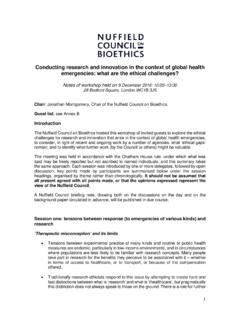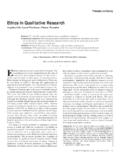Transcription of ETHICAL, SOCIAL, AND POLITICAL CHALLENGES OF …
1 ethical , SOCIAL, AND POLITICAL CHALLENGES OF ARTIFICIAL INTELLIGENCE IN HEALTHA report withFuture Advocacy is a think tank and consultancy working on some of the greatest CHALLENGES that humanity faces in the 21st century. We advocate for smart, forward-thinking policies that will allow us to capitalise on the opportunities and mitigate the risks presented by artificial intelligence. @FutureAdvocacyWritten and researched by Matthew Fenech, Nika Strukelj, Olly Buston for the Wellcome Trust April 2018 Future Advocacy 2018. All rights , SOCIAL, AND POLITICAL CHALLENGES OF ARTIFICIAL INTELLIGENCE IN HEALTH PageAcknowledgements03 Executive Summary04 Summary of ethical , social, and POLITICAL CHALLENGES and suggestions for further research06 Introduction09 Current and potential uses of artificial intelligence in health12 Process optimisation14 Preclinical research16 Clinical pathways17 Patient-facing applications20 Population-level applications24 ethical , Social, and POLITICAL Challenges25 What effect will AI have on human relationships in health and care?
2 25 How is the use, storage, and sharing of medical data impacted by AI?28 What are the implications of issues around algorithmic transparency and explainability on health?31 Will these technologies help eradicate or exacerbate existing health inequalities?33 What is the difference between an algorithmic decision and a human decision? 34 What do patients and members of the public want from AI and related technologies? 36 How should these technologies be regulated? 39 Just because these technologies could enable access to new information, should we always use it?40 What makes algorithms, and the entities that create them, trustworthy?41 What are the implications of collaboration between public and private sector organisations in the development of these tools?42 Conclusion442 ethical , SOCIAL, AND POLITICAL CHALLENGES OF ARTIFICIAL INTELLIGENCE IN HEALTH PageAppendices45A: Glossary of terms45B: List of abbreviations47C: List of interviewees48D: Patients and members of the public who contributed to this report51E: List of attendees at expert roundtable52F: Methodology by which patient/public contributors were recruited53G: Scenarios illustrating ethical , social, and POLITICAL CHALLENGES of AI in health and care543 ethical , SOCIAL, AND POLITICAL CHALLENGES OF ARTIFICIAL INTELLIGENCE IN HEALTHACKNOWLEDGEMENTSWe are very grateful to all the interviewees and participants in our roundtables held in February and March 2018, who very kindly gave their time to share their insights, expertise and experiences with us.
3 A full list of contributors is available in the thanks go to Eleonora Harwich, Head of Digital and Technological Innovation at Reform, who made excellent suggestions for potential interviewees for this are grateful to Jillian Hastings-Ward of the 100,000 Genomes Project, Mariana Campos of Genetic Alliance UK, Adam Cross of the Royal College of Physicians Patient and Carer Network, and Sinduja Manohar of the British Heart Foundation s Patient Data Panel, who helped with recruiting patients and members of the public to participate in this , we are very grateful to Dr Stephen Cave and the team at the Leverhulme Centre for the Future of Intelligence for their review of a draft of this report and their helpful comments and , SOCIAL, AND POLITICAL CHALLENGES OF ARTIFICIAL INTELLIGENCE IN HEALTHEXECUTIVE SUMMARYA rtificial intelligence (AI) is everywhere these days.
4 By taking an inclusive definition of intelligence as problem-solving , we can consider an artificially intelligent system to be one which takes the best possible action in a given situation. Such AI systems already filter our spam, decide what we see on social media, provide legal advice, and may even determine whether we re paid a visit by the police. As AI systems become better at sorting data, finding patterns, and making predictions, these technologies will take on an expanded role in health and care, from research , to medical diagnostics, and even in treatment. This increasing use of AI in health is forcing nurses, doctors and researchers to ask: How do long-standing principles of medical ethics apply in this new world of technological innovation?
5 In order to address this question, we have undertaken a detailed review of existing literature, as well as interviewing more than 70 experts all round the world, to understand how AI is being used in healthcare, how it could be used in the near future, and what ethical , social, and POLITICAL CHALLENGES these current and prospective uses present. We have also sought the views of patients, their representatives, and members of the have categorised the current and potential use cases of AI in healthcare into 5 key areas: Process optimisation procurement, logistics, and staff scheduling Preclinical research drug discovery and genomic science Clinical pathways diagnostics and prognostication Patient-facing applications delivery of therapies or the provision of information Population-level applications identifying epidemics and understanding non-communicable chronic diseases 01 What effect will AI have on human relationships in health and care?
6 02 How is the use, storage and sharing of medical data impacted by AI? 03 What are the implications of issues around algorithmic transparency/explainability on health? 04 Will these technologies help eradicate or exacerbate existing health inequalities? 05 What is the difference between an algorithmic decision and a human decision? 06 What do patients and members of the public want from AI and related technologies? 07 How should these technologies be regulated? 08 Just because these technologies could enable access to new information, should we always use it? 09 What makes algorithms, and the entities that create them, trustworthy? 10 What are the implications of collaboration between public and private sector organisations in the development of these tools? Across these use cases, a number of ethical , social, and POLITICAL CHALLENGES are raised and the 10 most important are: 5 ethical , SOCIAL, AND POLITICAL CHALLENGES OF ARTIFICIAL INTELLIGENCE IN HEALTHIn this report, we explore these and the other CHALLENGES raised by our research and make recommendations for further study in this complex and sensitive field.
7 We also find that there are overarching ethical themes, namely consent, fairness and rights, that cut across the CHALLENGES we identify. We ask how users can give meaningful consent to an AI where there may be an element of autonomy in the algorithm s decisions, or where we do not fully understand these decisions. Ensuring fairness through preventing and eliminating health inequality, and providing value to stakeholders is another critical issue. Finally, the right to health may well be expanded to encompass questions such as do people have a right to know how much AI is used in their care? and do people have a right not to have AI involved in their care at all? We recommend a multidisciplinary approach to dealing with these issues. This refers not only to galvanising a broad range of experts, many of whom will use and be impacted by these tools, but also to the active participation of patients, their relatives, and the public in their development.
8 It is equally important that these technologies are developed with a view to sharing their benefits as widely as possible. This is the best way to ensure that real-world CHALLENGES are addressed, that the needs of patients beyond their clinical care are considered, and that these technologies are accepted by patients and practitioners , SOCIAL, AND POLITICAL CHALLENGES OF ARTIFICIAL INTELLIGENCE IN HEALTHSUMMARY OF ethical , SOCIAL, AND POLITICAL CHALLENGES AND SUGGESTIONS FOR FURTHER research What effect will these technologies have on relationships between patients and healthcare practitioners? What effect will these technologies have on relationships between different healthcare practitioners? What do healthcare practitioners think about the potential for these technologies to change their jobs, or to lead to job displacement?
9 How do these tools fit into the trend of enabling patients to have greater knowledge and understanding of their own conditions? How different are they from looking up one s symptoms on a search engine before going to see a healthcare practitioner? Given that AI is trained primarily on measurable data, does reliance on AI risk missing non-quantifiable information that is so important in healthcare interactions? If AI systems become more autonomous, how should transitions between AI and human control be incorporated into care pathways?01 What effect will AI have on human relationships in health and care? How is medical data different from other forms of personal data? What is the most ethical way to collect and use large volumes of data to train AI, if the consent model is impractical or insufficient?
10 How do we check datasets for bias or incompleteness, and how do we tackle these where we find them? Should patients who provide data that is used to train healthcare algorithms be the primary beneficiaries of these technologies, or is it sufficient to ensure that they are not exploited? Are expert systems or rule-based AI systems more suitable for healthcare applications than less interpretable machine learning methods? What do patients and healthcare practitioners want from algorithmic transparency and explainability?02 How is the use, storage, and sharing of medical data impacted by AI?03 What are the implications of issues around algorithmic transparency and explainability on health?7 ethical , SOCIAL, AND POLITICAL CHALLENGES OF ARTIFICIAL INTELLIGENCE IN HEALTH Which populations may be excluded from these technologies, and how can these populations be included?











